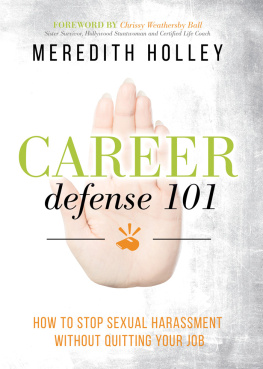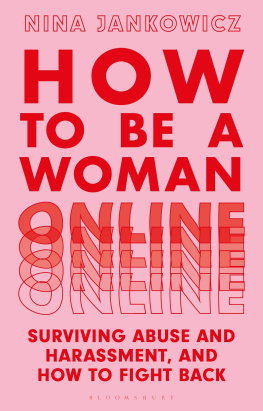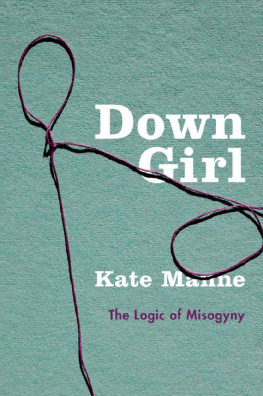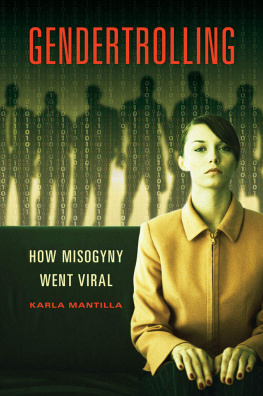All rights reserved. No part of this publication may be reproduced, stored in a retrieval system, or transmitted, in any form or by any means, electronic, mechanical, photocopying, recording, or otherwise, except for the inclusion of brief quotations in a review, without prior permission in writing from the publisher.
Mantilla, Karla.
Gendertrolling: how misogyny went viral / Karla Mantilla.
pages cm
ISBN 978-1-4408-3317-5 (hardback) ISBN 978-1-4408-3318-2 (ebk) 1. Internet and women. 2. Misogyny. 3. Sexual harassment. 4. Internet usersAttitudes. 5. Computer crimes. I. Title.
HQ1178.M36 2015
004.67'8082dc23 2015019524
This book is also available on the World Wide Web as an eBook.
Visit www.abc-clio.com for details.
The gifts I have been given by the following people have been life-altering and have literally (not figuratively) saved me at times that I desperately needed saving. That this book was ever begun, much less completed, is due entirely to them.
Ashwini Tambe, who believed in me, both professionally and personally, at a time when I was so far from believing in myself.
Brittany Fremaux, without whose sage advice and understanding I surely would not be here, and who promised/warned me that my initial article on this topic was important in ways I couldnt see.
Amy Hummel Corbin, who continually sent me updates and needed information, helped with proofreading, and has been a steadfast friend and advisor.
Kate Davison, whose neighborly pep talks were as insightful as they were wise, and who provided much support, both material and emotional.
Charlotte McNaughton, who kept me from abandoning the project just in time and thereafter was a steady supporter and cheerleader.
Julie Harris, faithful and true friend and demon-chaser extraordinaire, who understands the power of the demons and gave me untold ways of combating them.
Laurel Long, ever-loyal friend and persevering research assistant, who did much work on the manuscript when it needed it the most and diligently proofread every chapter in their rough forms.
Nina Mantilla, my beloved daughter, for endless (and more) hours of support, tangible and otherwise, and for dragging my dead horse over the finish line, notwithstanding my dogged insistence on giving up on myself. And for rendering indispensably incisive, perceptive, and well-deserved critiques on every chapter.
This book is dedicated to my adored children, Marcel and Nina Mantilla, whose wisdom, maturity, support, integrity, and kindness have been the biggest light in my life. In my wildest dreams, I would never have dared hope to have children as wonderful and talented as they have turned out to be.
Part I
Gendertrolling and Its Effects
Chapter
Introduction
You may be surfing the Internet and come across a topic being discussed in the comments of an article that you care deeply about, say, perhaps, recycling. You read comments debating whether it really makes a difference to recycle, given the scope of environmental problems on the planet. Fair enough. But then someone starts contributing what seems to you a slew of inane or irrational posts. This person writes that he (you wont know the gender, but trolls are most often male) never recycles and encourages his friends not to recycle, even going so far as to throw unrecyclable materials in recycling containers he sees so as to destroy others attempts at recycling. He expresses scorn for people who care about the planet and swears that he leaves his car running just to piss off those dirty eco-hippies. You become incensed and start explaining to him that environmental concerns are real and provide data and links to sites with solid and well-researched information about environmental issues. But it seems that the more information you provide, the more outrageous his claims are and the more insulting he becomes. You become angry and insult him back, telling him he is illogical, stupid, and obtuse, and asking him to educate himself on these topics. But he continues to spout his insulting and infuriating nonsense. In response, you become increasingly frustrated, but nothing you say seems to have any effect on his stance.
In all probability, youve been trolled.
This means the person you have encountered who has been expressing the anti-environmental sentiments may not actually believe anything he writes; he may even be an avid recycler IRL (in real life; IRL is an Internet term for distinguishing between online activity and real-life activity). His intention was only to get a rise out of youand he did. Youve been trolled.
It is unclear whether the etymology of the name troll derives from the words use in fishing, so that online trolling is seen as analogous to the fishing technique in which a baited line is dragged in water in the hopes of catching fish; or from the mythological creature who waits under a bridge to surprise unsuspecting people. However, the first known use of the word troll as an Internet phenomenon dates back to the early 1990s, when a user who called himself Troll posted on July 8, 1992. In his post titled Hi boyz and girlz, he (again, he is presumably male) writes,
Just some credentials. I am called Troll. I didnt get the name because Im a fun guy. I am the the [ sic ] champion of channel +insult on irc and I have thrice defended the title before the channel went down, so I can flame with the best. Flame away if you like, but Im gonna deal it back to you in spades. Cause when Im havin fun ya know I cant conceal it. Because I know youd never cut it in my game.Guns N Roses Troll
Trolling on the Internet consists of making online comments or engaging in behaviors that are purposely meant to be annoying or disruptive. People who engage in trolling activities use a variety of strategies to disrupt online discussions such as being obnoxiously illogical, feigning ignorance, bringing up extraneous or irrelevant topics, or otherwise derailing conversations. The behavior is committed with the express purpose of tweaking, upsetting, or enraging others. Online trolls relish the resulting fallout of their strategies, which includes the target becoming angry, perplexed, insulted, or frustrated.
There are online forums where trolls brainstorm strategies and brag about their exploits to their fellow trolls. In the early 2000s, trolls began to congregate in various Internet sectors, most notably on a subsection of the website 4chan called the /b/ board. 4chan currently has over 20 million visitors each month, Although that means 4chan is among the top 500 most frequented websites, the /b/ boards are only a subset of the website, and so 4chans high ranking does not mean that Internet trolls are comprised of huge numbers of people. Trolls often boast about their exploits on sites such as 4chan and Reddit where they develop and refine their strategies and techniques. Out of such forums, trolls have developed a variety of recognizable strategies that they use to provoke their targets.











